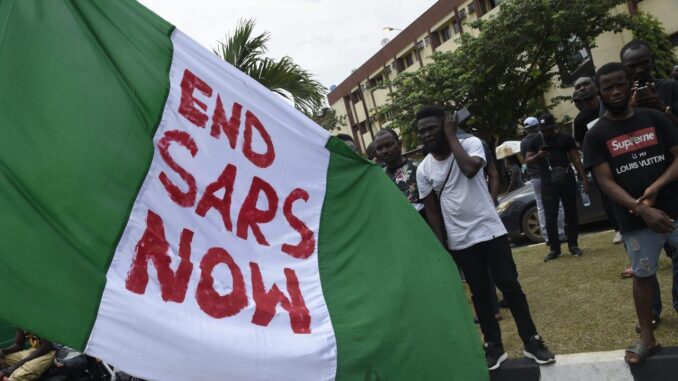
Last week, thousands of protestors took to our streets to oppose police brutality in the #EndSARS campaign. And their protests worked.
Immediately!
By Sunday, a statement from the office of President Buhari had announced: “the Special Anti-Robbery Squad (SARS) of the Nigeria Police Force has been dissolved with immediate effect”.
But if you think this is the end of the matter, you are very wrong.
One social media post in particular has stayed with me.
“Let it be clear that we are not just taking this stance against SARS, we are making a statement against bad governance. We did not inherit the silence of our parents.”
The inferno of outrage our nation has seen in the past week may have been sparked by the online sharing of graphic footage and shared experiences of police brutality – impossible to keep hidden in the social media age – but it was fuelled by a much wider distrust in national institutions our younger citizens, in particular, do not think speak or act for them.
And the chances are they will be protesting against other institutions soon enough.
We are a young nation in more ways than one. According to the United Nations, more than 60% of Nigerians are under 24. The #EndSARS protests saw that young population finding its voice and demanding better from an establishment which has been defined by poor governance since before they were born.
#EndSARS did not come about because these young people do not believe there should be police officers dedicated to dealing with robbery. It was because a mistrustful and toxic relationship developed between them and a police unit which seemed to look and act nothing like them, and all too often became perceived as a threat rather than a protector.
These protests created a platform for a deeply dissatisfied part of our country’s young population, who have been written off as feckless, big-headed, ostentatious and in the words of the President himself “lazy and uneducated”. It is not a platform they are likely to surrender.
The digital age has given Nigerians historically unimaginable access to information. It has given unprecedented power to organise. It has given them the previously inconceivable opportunity to have their messages amplified by high profile national international figures.
And when some of Nigeria’s biggest music stars, such as Davido and Falz, Star Wars actor John Boyega and Manchester United footballer Marcus Rashford are more accessible than local leaders, these local leaders need to be concerned.
At the digital democracy campaign I lead, we are developing smartphone tools to bring electors and elected closer together.
We need our leaders to demonstrate that they do look and act like the people they serve, and genuinely have the best interest of their communities at heart.
And social media doesn’t just expose our leaders’ wrongdoing. It gives them the platform to demonstrate both their virtues and their values.
We have developed a free app called Rate Your Leader to help the elected engage with the people who elect them, letting local leaders show themselves to be accessible, accountable and responsive to their communities. And that is the first step towards more trust in our political system as a whole. The app lets politicians truly understand the needs and wishes of their electorate, and quickly respond to any questions or concerns they have – and listening to their ideas to make their communities better.
The app also allows voters to rate their local politicians, boosting the credibility and reputation of those politicians with their own social networks.
In the social media age, politicians and political bodies can no longer hide themselves any more than they can hide their misdeeds. They have no choice but to be proactive and to use the power of social media to be truly transparent, to advance their accessibility and to effectively engage.
Another #EndSARS tweet also stayed with me.
“Whatever is agreed in secret will be brought to light, they cannot agree against the people so be rest assured they will need ‘Us’ to get things going forward. That is our Power. Secret oh, open oh, you shall meet us in the end. ‘Us’ is the Nigerian people”.
The lessons of history are clear. The institutions who do not respond to change are often swept away by it.
Joel Popoola is a Nigerian tech entrepreneur, digital democracy campaigner and the creator of the Rate Your Leader app. You can reach Joel on Twitter @JOPopoola
END

Be the first to comment